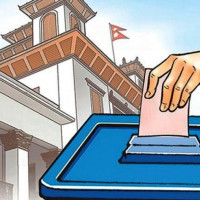- Wednesday, 25 February 2026
Around 800 medical seats at risk as MEC and private colleges lock horns over stipend
Kathmandu, Sept. 11: On August 22, the Medical Education Commission (MEC) called for interested universities, academies and colleges to fill out self-appraisal forms to operate different medical education programmes. The deadline was September 6.
Through the form, medical institutions had to demand seats in post-graduate programmes as well. However, despite the deadline ending five days ago, no private medical college filled out the form and sought the seats for post-graduate courses.
“The reason is simple. We cannot accept the provision imposed by the MEC regarding stipends for resident doctors,” Prof. Dr. Gyanendra Man Singh Karki, President of the Association of Private Medical & Dental College of Nepal, told The Rising Nepal.
There are around 1,200 post-graduate seats in Nepal, of which 800 seats are in private medical colleges. With the private colleges not applying for the programme in the upcoming session, 800 seats are at risk.
As per the notice of August 22, private colleges should demand for seats at the post-graduate level only after ensuring to provide a designated stipend to the resident doctors. The MEC states that the designated stipend equals the salary scale of the government’s 8th-level health worker, which is over Rs. 48,000 per month.
Private medical colleges argue that the provision was illogical in their case. “The fees for post-graduate (three-year) in private colleges is around Rs. 2.3 million and it is deposited in the university’s account. This is because post-graduate medical courses are university programmes. It is the University that designates stipend as well,” said Dr. Karki, who is also the owner of Biratnagar-based Birat Medical College.
Dr. Karki informed that the university had asked the colleges to provide Rs. 20,000 monthly as a stipend to the students. “We cannot raise it to Rs. 48,000+ under the same fee structure and without support from the government.”
The government colleges provide a high stipend after receiving budget from the state; post-graduate students in government institution are not charged any fee as well.
The Association has blamed the MEC for forcing the provision without consulting the universities, let alone private colleges.
On the other hand, the MEC stated that the provision was amended to bring uniformity in private and government colleges.
“We cannot have different provisions for government and private colleges. We do not differentiate based on anything,” Prof. Dr. Anjani Kumar Jha, vice-chairperson of the MEC, told The Rising Nepal.
According to Dr. Jha, despite no private colleges applying for the seats of post-graduate level, the MEC will move forward with its academic calendar.
However, as the MEC and colleges remain on opposite sides, the risk of seats for post-graduate declining by a majority persists.
“We want to provide post-graduate education because we, as senior doctors, want to pass our knowledge to the new generation. But we cannot do it by going in losses,” Dr. Karki stressed, adding, there were many active provisions affecting private colleges.
According to him, Birat Medical College procured two microscopes worth Rs. 7.2 million and 110 books worth IRs. 2.8 million for postgraduate students. “The prevailing laws demand hard copy of books and medical books are expensive increasing economic pressure on colleges. We are still abiding by such provisions. But if the authorities keep adding economic burden, we cannot survive,” said Dr. Karki.
The Association had also met with the Prime Minister on Sunday to discuss medical education. “Before we met the PM, we were told the MEC’s provision was a misunderstanding, so we did not raise the issue with him. But later, we found we were lied about it,” Dr. Karki lamented.
Nevertheless, the Association has assured to not move forward unless the stipend provision is amended or the state provides the extra amount to pay the resident doctors.
















